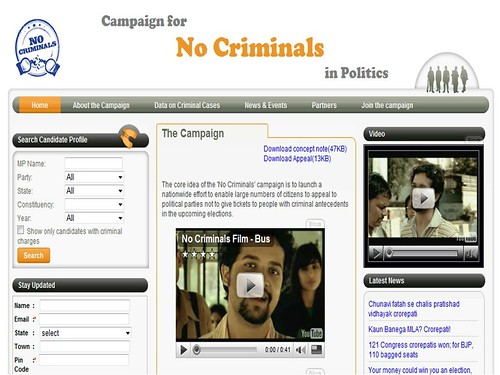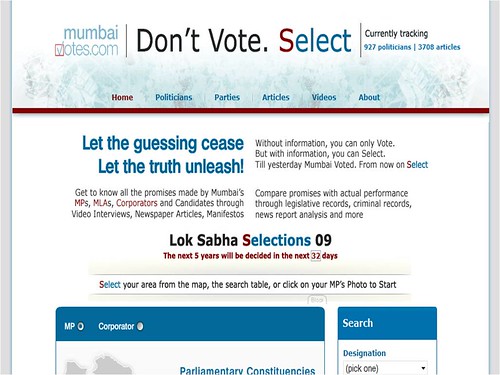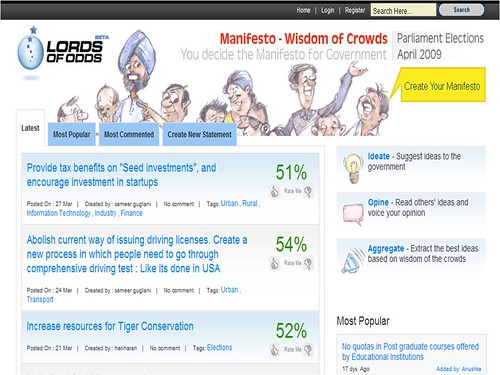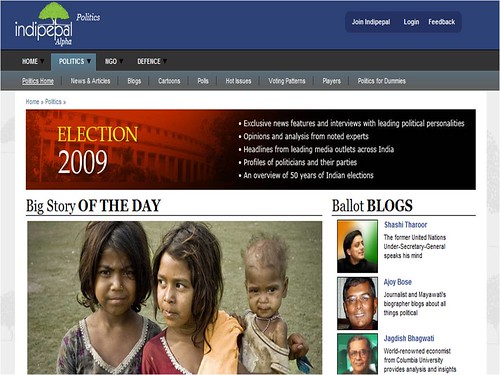In my first post for the Global Voices special coverage on the 2009 Indian general elections, I had analyzed how Indian politicians and political parties are using internet and mobile tools for election campaigning. In this post, I'll detail how civil society groups in India are using digital tools to run voter registration and transparency campaigns in the run up to the elections.
The National Election Watch, a collaboration between 1200 NGOs led by Association for Democratic Reforms, seeks to increase transparency in Indian elections by combining information about constituencies and candidates with user comments and ratings on candidates. However, the website suffers from inadequate usage and the absence of rich data (Live Mint).
The Campaign for No Criminals in Politics aims to ensure that no political party gives tickets to candidates with criminal antecedents in the 2009 general elections.
The data on its website is based on the affidavits submitted by the 2004 contestants. The campaign has an active Facebook group with almost 5000 members and has also launched two videos to promote its campaign –
Bharat Votes (Facebook/ Orkut) also aims to create awareness about voting using social media tools (IBN Live).
Vote India is another voter awareness website which has got some traction (AFP/ TOI/ Washington Post). It has an active presence on Twitter and Orkut (1/ 2/ 3) and has also used a video to promote itself –
Vote India's page on section 49(O) has been widely cited in what I believe is a misguided discussion on “negative voting”. Basically, the idea is that voters should have the right to ask for a re-election by selecting a “none of the above” option, if none of the candidates are acceptable to them (DNA/ IBN Live/ Economic Times/ Live Mint/ Mid Day). A chain e-mail falsely claims that such a rule already exists. Many bloggers, like Deva Prasad and Vimoh, strongly support the idea and even call it a powerful agent of change. A Facebook group promoting the idea has more than 100 members and an online petition to recognize the negative vote also has more than 100 signatures.
Several city and state specific websites have come up to help voters register to vote and make smart choices about their candidates. SmartVote and Bangalore Voter ID in Bangalore, Mumbai Votes in Mumbai, and Future CM in Andhra Pradesh are some of the more prominent examples.
Another category of websites aims to engage citizens into discussion and ideation on civic issues and then use the online community to initiate offline collective action at a later stage.
Lords of Odds, which runs an online sports prediction market in India, has started a Digg-like social voting micro-site called Manifesto to help citizens create their own manifesto for the elections.
I think that a social voting website focused on the elections is a great idea. In fact, three months back, I was toying with the idea of starting one myself at IndiaTalks. I wish that NGOPost, which runs an active social voting community on social welfare issues, would start a separate section on the elections.
Praja aims to use online tools to build a community of engaged citizens who can be mobilized to participate in offline collective action. Youth for Equality aims to build a political movement to end caste-based reservations in India. The Wada Na Todo Abhiyan aims to hold the government accountable to its promise to end poverty, social exclusion and discrimination. Change India, started by Lead India winner Rajendra Misra aims to channelize the energies of citizens, by building online and offline participatory platforms, to solve India's many problems (Rajendra Misra has recently joined BJP, so the initiative is hardly non-partisan anymore (DNA)). India Banao also aims to provide a platform for young people to participate in public affairs. For many of these websites, online participation is limited, and their effectiveness in organizing offline action is suspect.
Yet another category of websites aim to become the default source of news and analysis related the 2009 general elections.
IndiPepal is perhaps the most ambitious of these with blogs from several well-known analysts, but India Voting (Indian Express/ IBN Live), Engage Voter, India Numbers and India Votes 2009 also have content rich websites. These websites, however, are directly competing with election microsites from mainstream media — TOI, TOI Your Voice, DNA, The Hindu, Yahoo!, Yahoo! Your Manifesto, MSN, Rediff, NDTV and IBN Live (via Sidin Vadukut at Live Mint).
The Indian blogosphere has reacted positively to these grassroots initiatives, even though they have got limited traction. For instance, the ‘Indian Homemaker’ believes that campaigns like ‘No Criminals’ are a sign that we can still make a difference. Rajiv Dingra at WATBlog and Preethi J at Medianama have done good roundups of these initiatives.
Finally, the three most effective “civil society” campaigns in the 2009 general elections are run by corporate brands: Lead India/ Bleed India by The Times of India, Jaago Re by Tata Tea and My Idea from Idea Cellular. I'll cover these three campaigns in the next post in the series.
Cross-posted on Gauravonomics, my blog on social media and social change.











6 comments
Hi Gaurav,
Thanks for covering our election offering. We are seeing a fairly good response from netizens about our concept.
Asutosh
http://election.lordsofodds.com